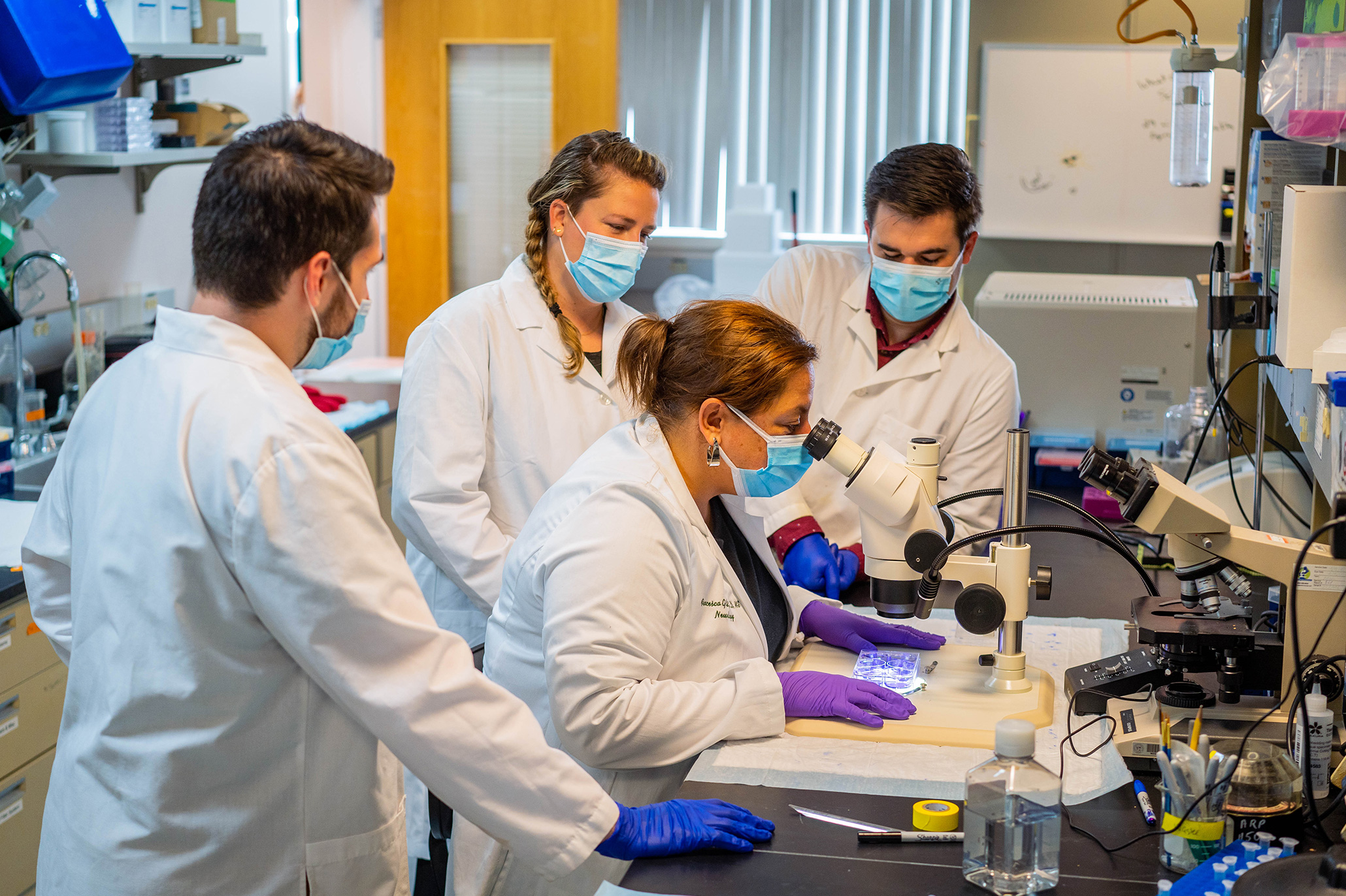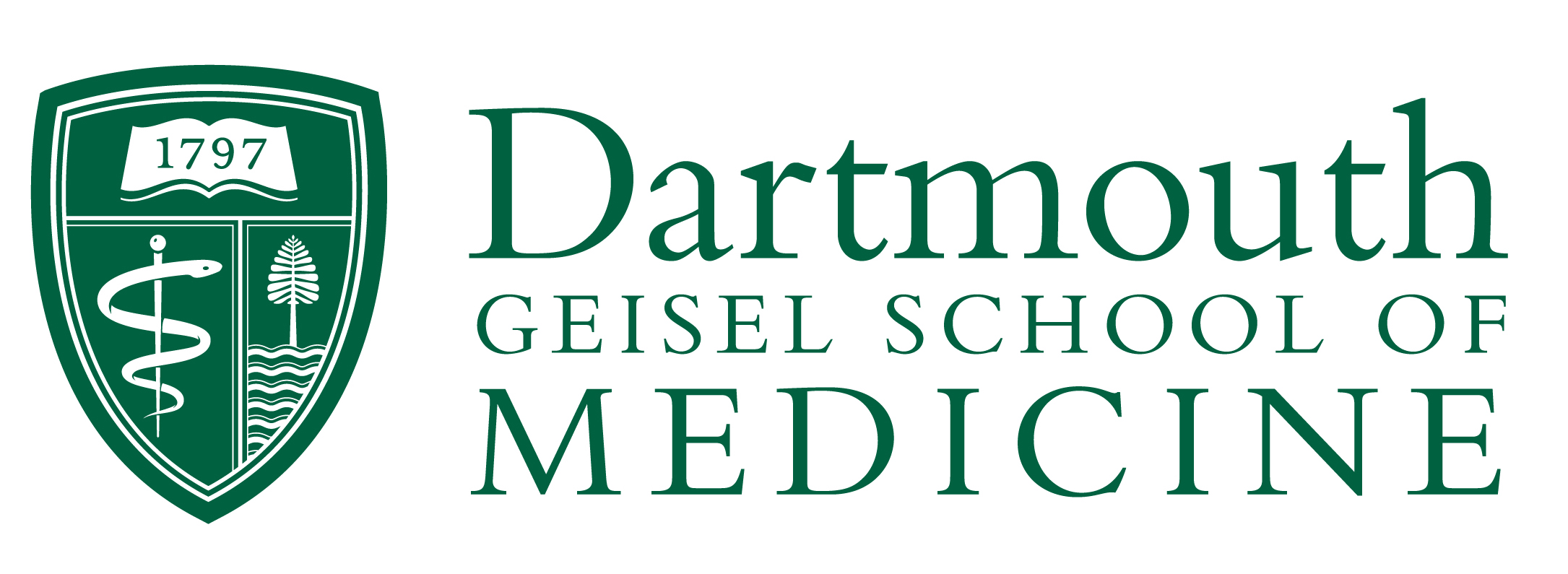Photos by Kurt Wehde
As with the successful launching of any graduate program in academic medicine, many contributing factors must come into play to help make it a compelling career choice for students. That was certainly the case with Integrative Neuroscience at Dartmouth (IND)—a new PhD graduate program established in July of 2021 that is part of the Guarini School of Graduate and Advanced Studies but spans much of Dartmouth Arts and Sciences, the Geisel School of Medicine, and Dartmouth-Hitchcock (D-H).
“It’s a great time to be entering the field of neuroscience,” says Marnie Halpern, PhD, chair of molecular and systems biology at Geisel. “On the national front, the development of many exciting techniques—such as optogenetics to manipulate neurons, CRISPR-Cas9 to edit the genome, and new imaging technologies—together with increased funding from programs like The Brain Initiative at NIH, are giving us more opportunities to increase our understanding of the brain.”
“At the same time, neurological and psychiatric disorders—such as Alzheimer’s disease, Parkinson’s disease, epilepsy, and depression—are becoming more prevalent. Despite the advances we have made in neuroscience, the underlying causes of these conditions are largely unknown, due to the complexity of the brain,” says Barbara Jobst, MD, the Louis and Ruth Frank Professor of Neurosciences at D-H and chair of the Department of Neurology.
Environment
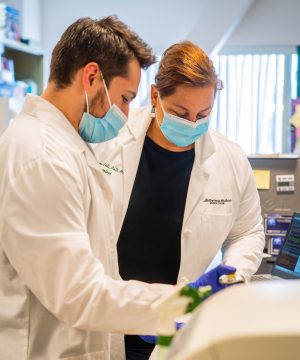
Both Halpern and Jobst recognized Dartmouth’s many strengths in neuroscience, as well as its supportive and collaborative research environment. So, in late 2020, when Guarini confirmed that it would be restructuring some of its graduate program offerings, the two worked together in order to realize the aspirations of molecular and systems biology faculty members Hermes Yeh, PhD, and Gio Bosco, PhD, to create a Dartmouth-wide neuroscience graduate program.
With strong support from leadership and involvement from many neuroscientists across Dartmouth, the effort began in earnest in January of 2021, with an intense, six-month planning process that included the formation of four committees—covering the areas of governance, curriculum, admissions, and community engagement.
The result is an innovative program that offers an array of scientific specialty areas—molecular, cellular, circuits, systems, perception, behavior, computation, and clinical neuroscience—with faculty from departments across Dartmouth and D-H, including Biology, Biochemistry and Cell Biology, Psychological and Brain Sciences, Neurology, Psychiatry, Surgery, Epidemiology, and Molecular and Systems Biology.
“One of the most exciting things about IND is the broad membership and collaborative nature of its faculty, which can come from Geisel, Arts & Sciences, Thayer School of Engineering, and Dartmouth-Hitchcock,” says Jon Kull, PhD, dean of Guarini. “This will allow IND students to learn about neuroscience from many different perspectives, ranging from fundamental science to cutting edge applications. And with so much national and international interest in neuroscience, having a dedicated program here will allow us to attract even more of the best students to Dartmouth.”
Breadth
This breadth and diversity of areas to explore within neuroscience is one distinctive feature of the IND program that prospective graduate students will find attractive, says Francesca Gilli, MS, PhD, an associate professor of neurology at Geisel and co-director of the IND program.
“Most neuroscience PhD programs around the country focus on one area, like basic neuroscience,” says Gilli. “Here at Dartmouth, we’re working across three areas—basic neuroscience, clinical neuroscience, and translational neuroscience—and that allows us to offer a 360-degree viewpoint, everything that might be useful for a future neuroscientist.”
Gilli, who chaired the recruitment committee, says early interest in the IND program is high. “We’re now focusing on the launching of the program and recruitment, so we won’t be welcoming our first class of five students until the fall of 2022,” she explains. “But we currently have 15 students of different years who have moved from other programs at Dartmouth to be part of IND.”
Students
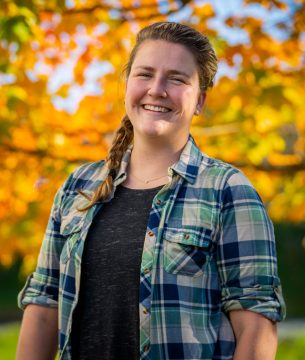
Another unique element of the program is the degree to which students have been involved in IND’s development and operation, says Nora Welsh, a fourth-year graduate student in the Gilli Lab whose research is focused on creating bioinformatic tools to improve the diagnosis and treatment of multiple sclerosis.
“While all of the initial committee work has been phased out, me and the other student representative, Eva Childers, are continuing to meet with the directors once a month to provide ongoing feedback, and that’s going really well,” says Welsh.
“I think the fact that students have been encouraged to offer their suggestions and critiques through the whole process has allowed us to incorporate successful elements we’ve seen in other graduate programs here and put together a PhD program in neuroscience that’s really geared towards meeting graduate students’ needs.”
Innovation
One example is the way the curriculum has been designed for first-year students. “In most traditional PhD neuroscience graduate programs, incoming students begin splitting up their time between their classes and their lab activities right away,” explains Mike Hoppa, PhD, an associate professor in the Biological Sciences Department at Dartmouth who co-directs IND with Gilli.
“With our program, they’ll stay together as a unit their first year, doing modules of hands-on, discovery-based science while taking all of their lectures,” says Hoppa. “That way, when they begin their lab rotations in the spring, and later select their thesis lab, they’ll be free from classroom distractions. They’ll also benefit from having this common foundation of experiences, and from having built a support network from their first day.”
This helps students become part of a close-knit program that values cross-lab interactions and fosters collaborative publications and mentoring, while also providing rigorous training in critical thinking, quantitative approaches, scientific communication, and community outreach.
Interaction
Throughout their PhD journey at Dartmouth, in addition to the program’s comprehensive coursework and research activities, students get to take part in weekly scientific seminars with their fellow IND program members to discuss primary literature, learn from and network with external speakers, hear about career opportunities, and give presentations on their own research projects.
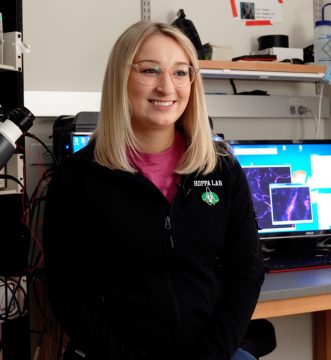
“Our new journal club format, which is part of the colloquia or seminars we’re doing, is one of my favorite parts of IND,” says Amelia Ralowicz, a third-year graduate student in the Hoppa Lab, who is using advanced microscopy techniques developed by colleagues at Dartmouth’s Thayer School of Engineering to study spontaneous neurotransmission in brain cells—where it occurs and what triggers it.
“We’ll read a paper and talk about it as a group (including students, faculty, and postdocs) one week and then the lead author of that research comes in the following week to discuss it with us,” she explains. “It’s an effective approach because it exposes us to so many different areas within neuroscience and allows us to learn firsthand from people who are at the top of their fields—about their research, their methods, and the whole publication process.
“And it’s just another example, I think, of the many advantages that we have as Dartmouth graduate students and IND members,” adds Ralowicz. “No matter what areas of neuroscience we end up choosing for our careers—whether it’s in industry, academia, or clinical medicine—we’re going to have acquired the skills and confidence to be successful.”
